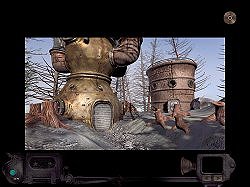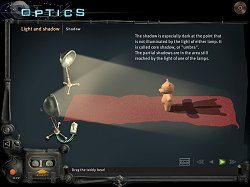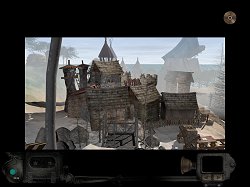|
Physicus
 According to some, Bioscopia, which hails from the same maker as this game, is the best edutainment title going around. It must be mighty good to be better than Physicus.
Right from the opening movie, the charm of the game and its bright demeanour is apparent, despite the dire straits in which the world finds itself. A meteorite has hit the Earth, and stopped the planet's rotation. One half of the world is freezing, the other overheating. Unless the rotation can be started again, Earth is doomed.
So it's up to you the "save the world with science". Can you generate enough electricity to fire up the impulse machine and get the world turning once more? Even the biggest edutainment-phobe should take the challenge. According to some, Bioscopia, which hails from the same maker as this game, is the best edutainment title going around. It must be mighty good to be better than Physicus.
Right from the opening movie, the charm of the game and its bright demeanour is apparent, despite the dire straits in which the world finds itself. A meteorite has hit the Earth, and stopped the planet's rotation. One half of the world is freezing, the other overheating. Unless the rotation can be started again, Earth is doomed.
So it's up to you the "save the world with science". Can you generate enough electricity to fire up the impulse machine and get the world turning once more? Even the biggest edutainment-phobe should take the challenge.
The game looks great, a visual mix of quaint and quirky. A somewhat child-like quality infuses its appearance, yet there is an amount of detail to satisfy even the most demanding graphic connoisseur. Light is used extremely well, giving depth and subtlety to the settings. It is sharp, colourful, and all up is an attractive place to spend time.
There is not a lot of motion in the scenes but nor are they a series of still lifes. At no stage did I feel I was in a static environment. A rope bridge moved, water rippled, smoke puffed from a chimney, a bug flew by. More overt activity can result from a puzzle solve. Small but well used ambient noise also contributed to help give the world a living and dynamic feel.
 The transitions from scene to scene are reasonably smooth, fading from one to the other. You can turn this off if you have a slower machine, in which case the game will be more "slide show" in its presentation. Directional arrows will indicate where you can go although I did think at times it should have been easier to turn or move to where I wanted to be without having to take some intermediate steps.
You can click some objects, and move others, cursors again indicating which option is available. You will also collect inventory items, "scanning" them into a database of available objects. Using them is a bit more laborious than it needed to be, but it does maintain the scanned approach. There also tends to only be a few items at any one time.
The puzzles are varied in difficulty and type, ranging from finding and using the right item to unravelling the mysteries of voltage or magnetism. Whilst the game proclaims itself suitable for persons aged 10 to 102, my almost 10 year old was out of her depth. 15 or 16 seems a better lower end. The transitions from scene to scene are reasonably smooth, fading from one to the other. You can turn this off if you have a slower machine, in which case the game will be more "slide show" in its presentation. Directional arrows will indicate where you can go although I did think at times it should have been easier to turn or move to where I wanted to be without having to take some intermediate steps.
You can click some objects, and move others, cursors again indicating which option is available. You will also collect inventory items, "scanning" them into a database of available objects. Using them is a bit more laborious than it needed to be, but it does maintain the scanned approach. There also tends to only be a few items at any one time.
The puzzles are varied in difficulty and type, ranging from finding and using the right item to unravelling the mysteries of voltage or magnetism. Whilst the game proclaims itself suitable for persons aged 10 to 102, my almost 10 year old was out of her depth. 15 or 16 seems a better lower end.
You can solve some of the puzzles by applying the Adventure Game 101 approach (ie pull and poke everything in sight), but you won't be able to muddle through them all. And whilst some of the principles needed to solve some puzzles will no doubt be known to you (even if like me you weren't quite sure of the "why" of the principle), most players will have to dip into the database at some stage.
This can often be the killer in edutainment games. The requirement to hunt through "dry" material looking for the right bit of knowledge can be a chore. Here, the database is almost fun in itself.
Once you have found your laptop (not difficult at all), when an aspect of the game is confronted requiring some knowledge or understanding of the physical principles involved (usually a machine of some sort), a hotlink to the subject matter appears at the top of the screen. This will take you straight to the relevant material on your laptop. An animated "lesson" then follows.
 You can choose to have a voiceover or not at the flick of a switch. I left it on as the quality was quite good. The lesson is accompanied by images and animations, which require simple interactions from yourself. Flick switches, lift weights, swap lenses and so on. But more than being mere illustrations, the graphics illuminate what you are being told, and help explain the concepts in an impressive way. The waxing and waning of the moon, night and day, and solar eclipse are all encapsulated in one little animation that you can fiddle with until it has well and truly sunk in.
You can access your laptop at any time to review information, which is categorised under the 5 broad subject headings used in this review, with an index within each. It is the science involved in those subject matters that is utilised in the puzzles.
The detail can get quite technical, yet to me it seemed quite carefully constructed to provide some "hard" science whilst not discouraging continuing with the quest. I thought the balance was well struck, and you should not be daunted the first time a physics formula rears its head. In most cases, the depth of detail is not necessary to solve the conundrum, although the information needed will be in there somewhere.
Nor does the game bog down in the information, or at all for that matter. Each bit of information or each item you find will generally be rewarded by an advance of some substance. Never did I feel that although I had acquired something new, I was still stuck in essentially the same place.
You will open new areas as you go, but you won't find everything you need to solve every puzzle in the one spot. Physicus encourages you to poke about, learning what you can, then making a mental (or written) note to come back when you have found or learnt something that might be useful. You can choose to have a voiceover or not at the flick of a switch. I left it on as the quality was quite good. The lesson is accompanied by images and animations, which require simple interactions from yourself. Flick switches, lift weights, swap lenses and so on. But more than being mere illustrations, the graphics illuminate what you are being told, and help explain the concepts in an impressive way. The waxing and waning of the moon, night and day, and solar eclipse are all encapsulated in one little animation that you can fiddle with until it has well and truly sunk in.
You can access your laptop at any time to review information, which is categorised under the 5 broad subject headings used in this review, with an index within each. It is the science involved in those subject matters that is utilised in the puzzles.
The detail can get quite technical, yet to me it seemed quite carefully constructed to provide some "hard" science whilst not discouraging continuing with the quest. I thought the balance was well struck, and you should not be daunted the first time a physics formula rears its head. In most cases, the depth of detail is not necessary to solve the conundrum, although the information needed will be in there somewhere.
Nor does the game bog down in the information, or at all for that matter. Each bit of information or each item you find will generally be rewarded by an advance of some substance. Never did I feel that although I had acquired something new, I was still stuck in essentially the same place.
You will open new areas as you go, but you won't find everything you need to solve every puzzle in the one spot. Physicus encourages you to poke about, learning what you can, then making a mental (or written) note to come back when you have found or learnt something that might be useful.
The game offers a large install, which means you will not have to change discs whilst playing it. You will however always have to start playing with CD 1 inserted, and then immediately change to CD 2 to load your saved game and then play. It's an irksome characteristic that could surely have been easily avoided.
Building a game so overtly around physics was a brave move, particularly given the database aspect. So too was trying to appeal to such a broad target audience. Yet Physicus succeeds, and does a much better job of providing an interesting and entertaining game than many non-edutainment titles. It would be a mistake not to play this game because of its edutainment tag, whatever your feelings about such titles.
Copyright © Steve Ramsey 2002.
All rights reserved.
System Requirements:
Windows 95/98/NT, Pentium 133 MHz, 32 MB RAM, 8x CD ROM, 14 MB disc space (650 MB full install) 800 x 600 resolution, 16 bit colour, SVGA graphics card, Sound card, Quicktime 3 (on disc)
Macintosh PowerPC 166 MHz, System 7.5, 16 MB RAM, 8x CD ROM, 14 MB disc space (650 MB full install) Thousands of colours, Sound card, Quicktime 3 (on disc)
|
